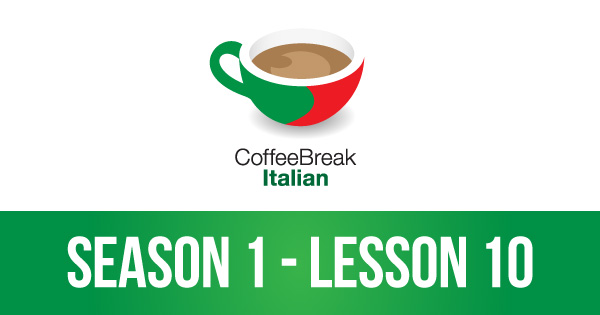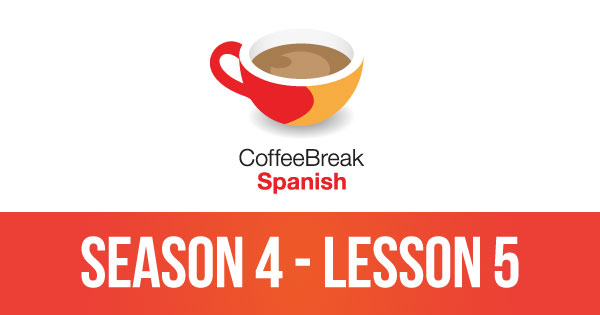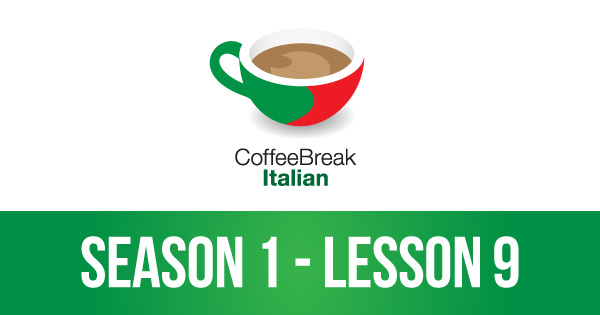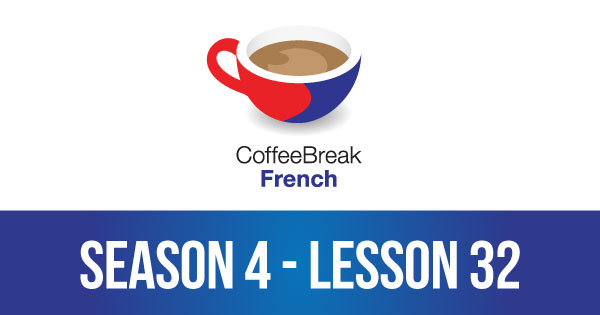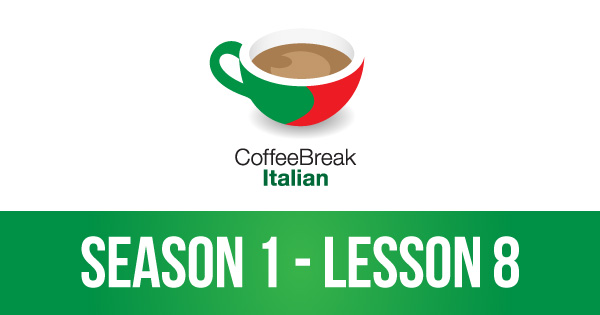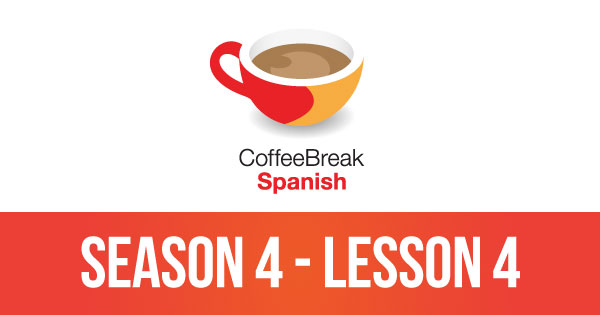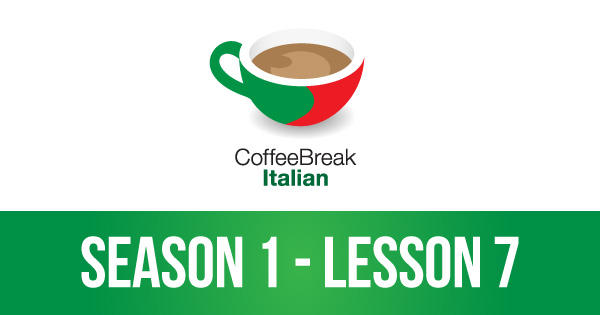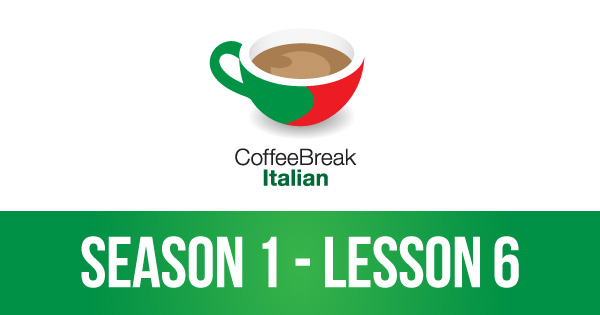Join native speaker Francesca, learner Katie and teacher Mark in this latest lesson of our series for beginners in Italian. It’s time to test your understanding of everything we’ve learned so far in the series in this review episode.
Month: March 2015
Episode 5 – Season 4 – Coffee Break Spanish
In this episode of our advanced Spanish course we join Rory who is writing an email to María, telling her of the latest goings on in Consuelo’s hotel. As usual the episode is rich in idiomatic expressions and complex grammatical points and Mark and Carmen are on hand to discuss the language used.
CBI 1-09 | Language problems and talking about which languages you speak
Join native speaker Francesca, learner Katie and teacher Mark in this latest lesson of our series for beginners in Italian. In this episode we’re talking about language problems: saying which languages you speak and solving problems when you don’t understand what people are saying to you.
Season 4 – Episode 32 – Coffee Break French
It’s time for another episode in our series for advanced French learners. In this lesson Mark and Pierre-Benoît are discussing the latest email from Matthieu to Gabrielle. There are many interesting expressions and useful grammar points covered including agreement of preceding direct objects, rien que de + infinitive, en avoir l’eau à la bouche, and much more.
CBI 1-08 | Talking about what there is to do in the town in Italian
Join native speaker Francesca, learner Katie and teacher Mark in this latest lesson of our series for beginners in Italian. In this lesson we’re learning more useful language for getting around in the town and we’ll also be looking at some simple aspects of Italian grammar.
Newsletter Activity 5 – Il faut…
In this activity we’re going to have a look at the irregular verb falloir.
Falloir is an impersonal verb which means that it can only be conjugated in the third person singular (il) form giving il faut. It means “to be necessary”, “to need to do something” or “must”.
This impersonal structure can be followed by an infinitive:
- il faut travailler dur quand on est jeune – it’s necessary to work hard when we’re young
If we want to conjugate the second verb then we must add que and use the subjunctive:
- il faut que nous mangions tôt pour aller au cinéma – we must eat early to go to the cinema
Il faut can also be followed by a noun:
- il faut de l’argent pour partir en vacances – one needs money to go on holiday / vacation
Remember that the il here does not refer to anyone in particular but is similar to “one” in English or a general “you”.
Il faut faire attention could be translated as “one must be careful” or “you have to be careful”.
Mettez-le en pratique!
Try writing a statement about what you think “one must do”. If you’re struggling for ideas, perhaps you could start by translating these statements using the construction il faut…:
- one needs sun to be happy!
- it’s necessary to learn how to write when we are young
- we must go to work to earn money
Bon courage!
Newsletter Activity 5 – Manual de la Felicidad
In this activity we’re going to practise using el imperativo.
The imperative is used for giving commands and instructions but in Spanish, it can also be used to give advice. Your challenge is to write a “Happiness Manual”, o en español: “un manual de la felicidad”. For this manual you will need to use the second person singular: tú. The tú affirmative imperative is identical to the third person singular of the present indicative:
- cantar: él o ella canta
- comer: él o ella come
- vivir: él o ella vive
It is important to remember that the following verbs are irregular:
- decir > di
- hacer > haz
- poner > pon
- salir > sal
- ser > sé
- tener > ten
- venir > ven
To form the negative tú imperative, we use the second person singular (tú) of the present subjunctive:
- cantar: ¡no cantes!
- comer: ¡no comas!
- vivir: ¡no vivas!
In both cases the pronoun (yo, tú, él, ella etc.) is omitted.
Aquí va nuestro consejo:
- ¡Sonríe todos los días!
¿Cuál es tu consejo para ser feliz? What advice would you give someone to live a happy life? In a comment below, leave your recommendations by using the tú form of the imperative as in the above examples.
Episode 4 – High Five French
Join Emma and Mathilde in this ten-lesson podcast series for younger learners of French. In this episode, you’ll learn to say how old you are and to count from one to twelve.
Listen to the episode
High Five French Membership
The free podcast is only the beginning! High Five French is a full forty-lesson video course with a range of materials allowing children to learn and understand the French language. Purchasing a membership gives access to the following elements for each of the forty lessons:
- video episode: join Emma and Mathilde on location in France in our video episodes. The video presents the language covered in the lesson in a fun way, allowing children first to hear the French word or phrase, and then to see it on the screen as Mathilde encourages viewers to repeat the word and practise their French.
- the High Five French Radio Show: this bonus audio recording provides further practice of the words and phrases covered in the main video lesson, and also provides some bonus vocabulary. Each episode of the radio show finishes with a musical review of the words and phrases of the lesson.
- activity sheets: we’ve included two activity sheets for each lesson, allowing children to practise the written language in fun puzzles and activities.
- transcripts: there are full transcripts of the video lessons with explanations of any unfamiliar French words.
- notes for parents: if you’re not familiar with French, it can be difficult to support your child in their learning. Our notes for parents for each lesson will help you help your child learn! There are explanations of the difficult words and phrases and background information on the language and culture of the French-speaking world.


The members’ version can be accessed through our membership system. You can purchase a membership using the links below. The complete course of 40 lessons is already available, so as soon as you purchase you will have access to all 40 lessons.
- Access a trial lesson and find out more here
The course includes 40 streaming video lessons, 40 streaming audio lessons, activity sheets, notes for parents
(£99.00 GBP inc VAT / approx $124.00 USD ex VAT for non EU customers)
Information for teachers
If you’re a teacher and you’re interested in using this resource within your school, we provide a licence for using High Five French in schools which includes all the resources mentioned above and comprehensive notes for both specialist and non-specialist teachers. High Five French is the perfect way to introduce French in an engaging way to younger learners. Visit Radio Lingua Schools for more information.
Subscribe links
Subscribe in iTunes | RSS Feed | Purchase members’ audio and transcripts
Episode 4 – Season 4 – Coffee Break Spanish
In this latest episode of our advanced Spanish course we join María in her latest diary entry. Rory has just arrived in Mallorca and María tells us of his first day on the island. As usual Mark and Carmen are on hand to discuss the interesting grammar points and idiomatic expressions covered in the text.
CBI 1-07 | Asking for directions in Italian
Join native speaker Francesca, learner Katie and teacher Mark in this latest lesson of our series for beginners in Italian. In this lesson you’ll learn to ask for directions in the town and understand some simple answers.
Season 4 – Episode 31 – Coffee Break French
Join Mark and Pierre-Benoît for another lesson of our advanced French course. In this episode they’re discussing Gabrielle’s revelations in her most recent email to Matthieu. As usual there are plenty of interesting grammar points and idiomatic expressions to study including the expressions prendre ses clics et ses clacs and aller en éclaireur.
CBI 1-06 | More about family, counting and phone numbers in Italian
Join native speaker Francesca, learner Katie and teacher Mark in this latest lesson of our series for beginners in Italian. In this lesson you’ll learn to talk more about your family, and you’ll learn the numbers from zero to ten, allowing you to talk about phone numbers in Italian.
Newsletter Activity 4 – Lo que más me gusta hacer es…
In this activity, we’d like you to answer the question ¿qué es lo que más te gusta hacer los fines de semana?
Although the question is relatively straightforward, your answer needs to follow the same construction as the question. You form the response in this way:
Lo que más me gusta hacer los fines de semana es + infinitive.
For example, you could say:
- lo que más me gusta hacer los fines de semana es salir de copas con amigos
- lo que más me gusta hacer los fines de semana es quedarme en la cama hasta las diez
You can use this construction in a variety of ways by changing the verbs in the question:
- ¿qué es lo que más te molesta?
- ¿qué es lo que más valoras en la vida?
- ¿qué es lo que más te gusta comer?
Leave a comment below to answer the question ¿qué es lo que más te gusta hacer los fines de semana? Then try to come up with some other questions and answers which use this structure.
¡Ahora os toca a vosotros!
Newsletter Activity 4 – talking about countries
In this newsletter activity, we would like to test your knowledge of prepositions in French, with a particular focus on how you say “in” or “to” when talking about a country. We’d like to you post a comment telling us about a trip you’ve got planned for this year (if you haven’t managed to book anything yet just make it up!).
If you want to say you are going to a feminine country or that you are in a feminine country, you need to use the preposition en:
- j’habite en Angleterre
- en août j’irai en France
- j’aimerais vivre en Australie
It’s the same for masculine countries that begin with a vowel:
- l’année dernière il est allé en Uruguay
- maintenant ma soeur habite en Équateur
- je vais en Argentine
For masculine countries that begin with a consonant, you use au or aux depending on if the country is singular or plural:
- je suis au Royaume-Uni jusqu’à lundi
- mon amie Katelyn vient de déménager aux États-Unis
C’est à vous: try to write one of your own sentences using these guidelines to tell us where you plan to go later this year. Rules for islands, cities and continents are a little different so try to focus on talking about countries for now and don’t forget to check the gender of the country you’re talking about! It can be helpful to learn a few examples so that you can apply the rules to other countries, for example “en mai, j’irai EN France“, “l’année dernière je suis allé(e) AUX Pays-Bas“. Choose some of your favourite countries to help you remember!
Bon courage!

